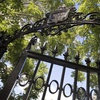{shortcode-8925ed4b6d449b63e7ec4012e233f5afcdb7891f}
Before coming to Harvard, I assumed that the key to getting into law school and pursuing my Elle Woods-esque fantasy was simple: prioritize coursework above all. I imagined spending my four years here buried in readings, research, and essays, with little time for anything else.
But once I arrived on campus, I quickly realized that wasn’t the case. Instead, academics often take the backseat to resume-building leadership roles.
There’s an unspoken rule at the College: Having an excellent academic record isn’t enough. If you want to impress, you need to be a leader. And not just any leader — you need to be the president, director, or chair of a program, preferably multiple. You can’t just be involved; you have to be in charge.
While extracurriculars are extremely useful, academics are the main purpose of Harvard. Students must reevaluate our priorities to ensure that academic growth remains at the core of our college experience.
The internal pressure that students face to fill resumes with prestigious leadership positions is overwhelming, and it doesn’t come from nowhere. Students seem to believe that extracurriculars, rather than coursework, are the golden ticket to selective graduate schools and competitive careers.
The idea is that admissions offices want proof of ambition, and the best way to demonstrate that isn’t just through seminar discussions or well-crafted essays, but through club titles. Student culture equates prestige with leadership roles and assumes that a stacked LinkedIn profile holds more weight than intellectual depth, even when graduate school admissions emphasize academics.
This disconnect stems from pressure to stand out in an already accomplished academic setting where grade inflation blurs distinctions, driving students to chase extracurriculars for an edge.
As a result, students can overload their schedules, sometimes prioritizing leadership roles over academics. We tell ourselves that we’ll do our readings after this club meeting or that internship application, and over time, academics start to feel secondary.
And this culture is so normalized that skipping readings, lectures, or even pulling all-nighters isn’t seen as a sign of imbalance, it’s seen as a badge of honor. If you aren’t exhausted, are you even doing Harvard right?
What makes this ironic is that we came here for an education. Harvard is home to world-class professors, research, and academic challenges. Yet, we rarely treat coursework as the main event.
We tell ourselves that leadership is what will get us into law school when, in reality, some of the most important skills — critical thinking, writing, and analysis — are developed primarily in the classroom.
Let’s be honest! Harvard academics are too valuable to take for granted. We have acquired an education that people would give anything for. We have access to resources that most students could only dream of.
We can’t afford to waste that. Harvard isn’t just a name that opens doors or a launchpad for our careers — it’s a place where we are challenged to think harder, question deeper, and engage fully. Every class discussion, paper, and reading that expands our understanding is part of what makes this education exceptional. To treat it as secondary would be to miss out on the very thing we came here for.
This isn’t to say that extracurriculars don’t matter. Leadership experience can be valuable, teaching students how to organize, advocate, and manage responsibilities. In my own experience, joining and becoming a leader in different student organizations has allowed me to build important skills that extend beyond the classroom.
But the key is finding balance. When we prioritize academics, we strengthen the very abilities that allow us to contribute to our clubs and organizations in a deeper, more impactful way.
So, if we want to make the most of our time here, we have to push back against the assumption that success and our future achievements are measured by leadership titles alone. This means consciously reevaluating our priorities and recognizing that academic success is not just a stepping stone, but the foundation for long-term achievement. Students should dedicate time to fully engage in coursework, participate in class discussions, and invest in developing critical thinking and writing skills.
We should give academics the weight they deserve in our Harvard experience, not treat them as something we fit in between club meetings. We can still lead, advocate, and pursue our passions while making sure that academic excellence remains the foundation upon which our future success is built.
Because at the end of the day, a Harvard degree should mean more than just a killer LinkedIn profile.
Kelli D. Higgins ’28, a Crimson Editorial Editor, lives in Thayer Hall.
Read more in Opinion
We Need a Paradigm Shift in Our Approach to Street Safety












